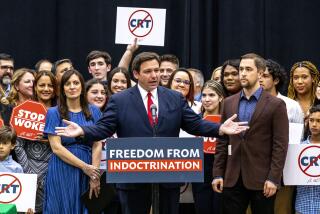A Season for Bookish Politics
- Share via
While Washington politics dimmed to a flicker during the holidays, literary politics were glowing like a Christmas tree. The right-leaning National Alumni Forum released a study last week showing that only one-third of elite American colleges now require their English majors to study Shakespeare.
The organization--whose members include neoconservative guru Irving Kristol and Lynne Cheney, former chief of the National Endowment for the Humanities--said the study is the latest and most dramatic symbol of how radical professors are failing to school American students in the classical works that have inspired and shaped our nation.
Meanwhile, the Modern Language Assn., the left-leaning academic group that many in the alumni forum accuse of leading literature study astray, held its mammoth annual convention last week. Thousands of young scholars lobbied colleagues for professorships in literature and the humanities while listening to baby-boomer academics give lectures with titles like “Where Does School End?: Students and Professors at Sex Clubs,” “The Semiotics of Sinatra” and “Narrating a Feminist Ethic of the Other.” Some of the books celebrated as classics were less than a year old.
William Bennett, Robert Brustein and other traditional critics of the Modern Language Assn. raise legitimate concerns about academia’s shift from the respectful study of the old to a more irreverent and broad-ranging analysis of the contemporary.
For instance, the language association and many college literature departments have adopted a definition of their purview so sweeping that it encompasses not only books, poems and language but film, art, advertising, song, sexual and racial politics and religion. Conservatives are right to argue that some literature departments have strayed so far afield that they are losing a sense of academic discipline.
The critics are wrong, however, to suggest that the study of literature need not respond to a changing world. In fact, the Modern Language Assn. has strengthened American culture. The organization was founded in 1882 by scholars who had tired of simply mimicking European literature’s traditional focus on teaching Latin and Greek and who argued that the time had come to fashion a uniquely American literary curriculum. That curriculum recognized that the study of literature must not, as novelist Upton Sinclair once put it, worship authors simply because they are “cold and pure and very dead.”
The language association’s skepticism is honorable. As Phyllis Franklin, its executive director, has said, literary courses must change as people find “new ways to look at things.” But it’s important to remember that when the things being looked at are eternal verities like love and war, sometimes old eyes--Shakespeare’s, for instance--see better than new ones.
More to Read
Sign up for our Book Club newsletter
Get the latest news, events and more from the Los Angeles Times Book Club, and help us get L.A. reading and talking.
You may occasionally receive promotional content from the Los Angeles Times.







